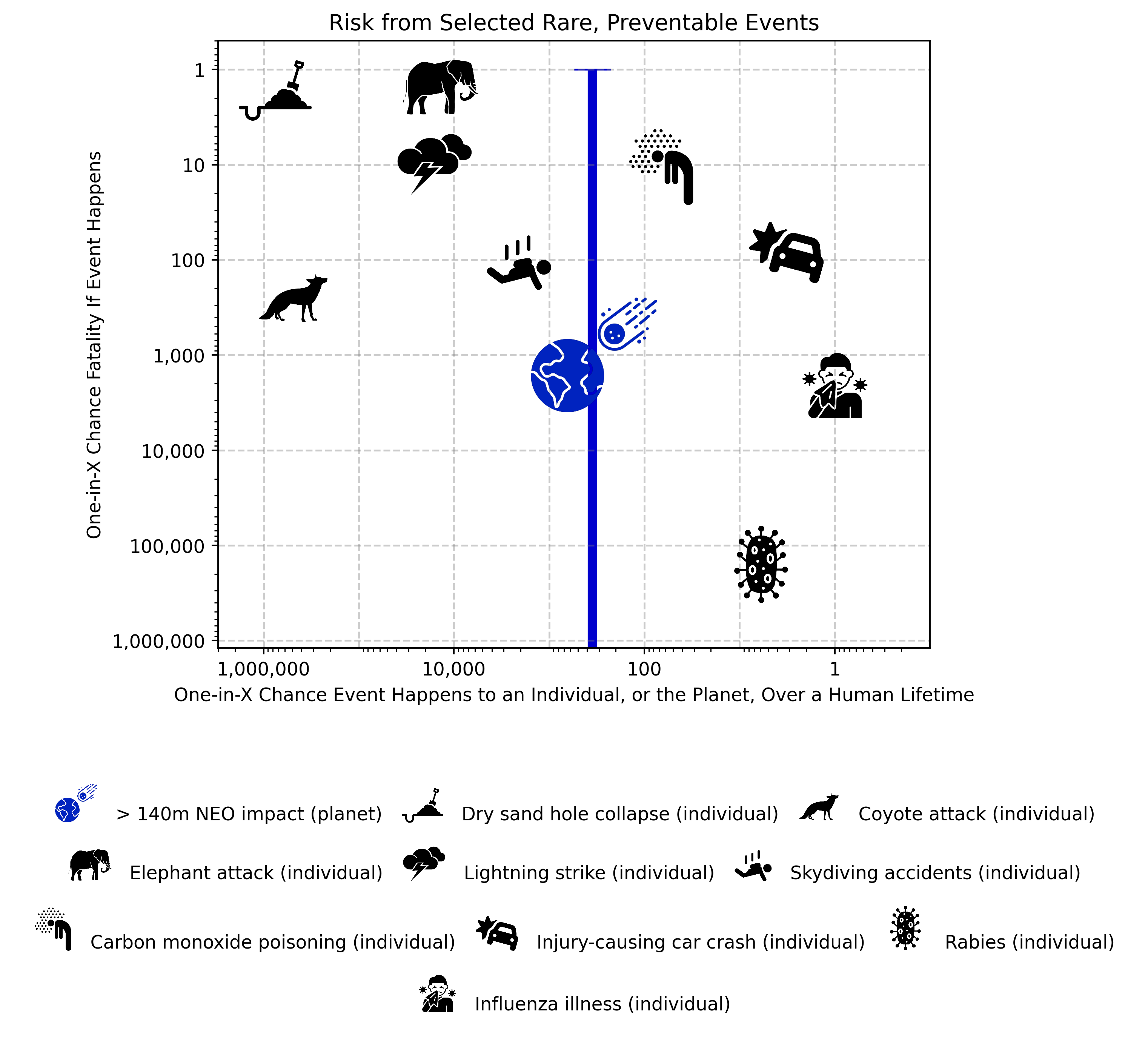Humans are not the most rational beings when it comes to fear, especially about things that are interesting and dramatic in the media, but are rare occurrences in real life. If you are a millennial, you’ll know by now that quicksand, while dangerous, is not quite the threat we were promised as kids. Asteroids, however, are an interesting threat. We know they are serious, but how worried should we be?
In a new paper, to get a better grasp on the risk of an asteroid impact and put it in context with other risks, astronomers have compared your chances of death by asteroid to being killed by lightning, rabies, or even elephant attack. Some of the probabilities of risks might surprise you. For example, the chance of an asteroid larger than 140 meters hitting Earth is actually higher than an individual being struck by lightning.
You might be thinking, wait a minute, Roy Sullivan was hit by lightning seven different times and lived, while I have not heard of any city-killer asteroid hitting the planet. In fact, an asteroid of that size hits our planet on average once every tens of thousands of years, making the chance that it will happen during a human lifetime (average of 71 years) small but not as small as you might think.
Although an asteroid impact is pretty unlikely to occur in any given year, the probability is not zero, and might be higher than some people expect.
Prof Carrie Nugent
“I think most people know that asteroids can hit the Earth. But, most people have no context on how often that happens. We compared the probability of a > 140-meter asteroid or comet hitting the Earth over a human lifetime with the probability of other rare, preventable events that may happen to a person over their lifetime, like car crashes and wildlife attacks. A 140-meter object could cause regional devastation on impact, so that’s why we considered that size range,” lead author Professor Carrie Nugent from Olin College told IFLScience.
The team compared asteroid impacts to several other events. For example, elephant attacks in Nepal, affecting less than 30 people with 18 fatalities in 2016 over a population (at the time) of 27 million. What about lightning strikes? The team used data from the Centers for Disease Control and Prevention, which reports between 2006 and 2021, on average 277 people were affected with 28 fatalities a year in a population of 320 million people in the US. Statistically, both of these events are rarer than an asteroid impact over a human lifetime. According to the research, skydiving accidents, dry sand hole collapse, and coyote attacks are also rarer.

All papers should come with graphs like this.
What’s not rare are carbon monoxide poisoning, injury-causing car crashes, rabies, and influenza. The team also estimates the mortality from each of these. While all the earthly preventable events are roughly well defined, there are huge uncertainties on the asteroid impact. It depends on the size, the speed, and composition of the asteroid, as well as where it impacts.
“Although everyone’s individual situation and risk are different, on average, it’s slightly more likely that a >140-meter asteroid or comet hits the Earth than an individual is struck by lightning. An impact is less likely than experiencing carbon monoxide poisoning. Although an asteroid impact is pretty unlikely to occur in any given year, the probability is not zero, and might be higher than some people expect. But, just like carbon monoxide poisoning is preventable, so is an asteroid impact – if we have enough time to prepare,” Professor Nugent explained to IFLScience.
Planetary defense has really stepped up in the last few years, especially with 2022’s DART mission, which demonstrated that we can shift the orbit of an asteroid (possibly creating the first human-made meteor shower) if need be.
As a fun fact, Professor Nugent has found and proposed the names for many asteroids, including (7052) Octaviabutler and (6486) Anitahill. In 2022, she proposed the name for asteroid 10731 dollyparton, which is a main belt asteroid, not a Near-Earth object, so it will absolutely not take your man. We couldn’t pass up the chance to ask more about that.
“I love asteroid names! I think they are a fun and interesting way to tell asteroids apart,” Professor Nugent explained. “There are lots of fantastic asteroid names out there, such as Potato and Dioretsa. Dioretsa is ‘asteroid’ backwards, and is named because Dioretsa was the first asteroid that was discovered to orbit around the Sun counter-clockwise instead of clockwise. It’s a great honor to propose asteroid names, and I am always delighted to recognize extraordinary individuals in that way.”
The work is accepted for publication in The Planetary Science Journal and is available on the ArXiv.
Source Link: Are You More Likely To Be Killed By An Elephant Or An Asteroid? Science Now Has The Answer